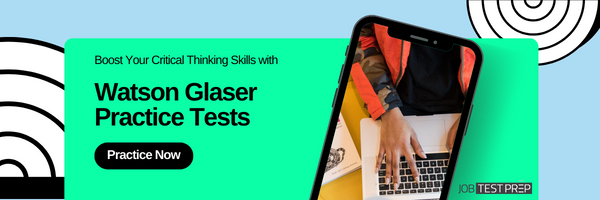What Is The Watson Glaser Test?
The Watson Glaser Test measures the skills required to present a certain point of view in a clear, well-structured, well-reasoned, and persuasive way to convince others of your argument.
Originally created by Goodwin Watson and Edward Glaser, the test is designed to assess a person’s critical thinking abilities – among other things – and is widely used across legal practices. It is a comprehensive aptitude test that helps law firms to create a shortlist of candidates deemed likely to have what it takes for training contracts and vacation schemes.
In a law-based scenario, your critical thinking ability is extremely important. The Watson Glaser Test assesses your ability to:
- Think critically
- Come to conclusions
- Analyse strong and weak arguments
- Recognise assumptions
- Evaluate arguments
What Does The Watson Glaser Test Involve?
The Watson Glaser Test follows a multiple-choice format and can feature up to 40 or 80 questions split into five sections, including:
Assessment of inferences (5 questions*). Test questions are focused on a single statement that you must assume is true. You are not able to use any outside knowledge to influence your answer. The single statement is then followed by a series of inferences relating to it, which you will be required to label either true or false.
Recognition of assumptions (12 questions*). You are issued with another statement to assess and you are then given a number of assumptions related to that statement. You then need to deduce whether assumptions have, or have not been made.
Deduction (5 questions*). You are presented with a passage and a series of proposed conclusions to the passage. You will need to determine whether the conclusion follows or doesn’t follow the information contained in the passage.
Interpretation (6 questions*). You are presented with a passage in which you assume everything to be true. You must then determine the level of importance of the information provided and apply it logically – analysing whether or not the conclusion follows.
Evaluation (12 questions*). From the information provided, you must be able to decide whether the argument presented is a strong one or a weak one.
*based on 40 questions being asked.
How Long Is The Watson Glaser Test?
The standard time given to complete the Watson Glaser Test is anywhere between 30 and 60 minutes – depending on the number of questions being asked. You will be given a deadline or time limit for completing the test by the law firm you are applying to for a training contract or vacation scheme.
Why Do Employers Use The Watson Glaser Test?
More candidates are applying for training contracts and vacation schemes every year. With critical thinking being a key component of the legal profession, the test has become a great assessment tool not only to assess a candidate’s critical thinking ability, but to speed up the candidate application process.
Watson Glaser Test Results
A good Watson Glaser Test score depends on the quality of your Watson Glaser Test answers and the firm that you are applying to. The pass mark for the test varies from year-to-year based on the average Watson Glaser test score achieved by candidates across each law firm.
To give yourself the best chance of being chosen for a training contract or vacation scheme, a Watson Glaser Test score of 75% or more is what you should aim for. However, you shouldn’t solely rely on passing the test to secure a job offer from a law firm as candidates are assessed across all areas of the recruitment process, including the quality of training contract applications.
Watson Glaser Test Example Questions
Assessment of Inferences Sample Question
Statement: Two hundred students in their early teens voluntarily attended a weekend student conference in a city in England. At this conference, the topics of race equality and means of achieving lasting world peace were discussed, since these were the problems the students selected as being most vital in today’s world.
| Inferences | Answers | Explanations |
|---|---|---|
| 1. As a group, the students who attended this conference showed a keener interest in broad social problems than do most other students in their early teens | PROBABLY TRUE | We know that the students ‘voluntarily’ attended so this implies they are interested in the broad social problems. We are also told that the problems discussed were selected by the students themselves. These points do not definitively prove that the statement is true. But they suggest it is likely the case |
| 2. The majority of the students had not previously discussed the conference topics in their schools | PROBABLY FALSE | Had this been the case, it would have been hard for the students to agree upon them as ‘the most vital in today’s world’. But there is nothing to prove that it is definitely false |
| 3. The students came from all parts of the country | INSUFFICIENT DATA | The answer is quite straightforward because the topic isn’t mentioned! |
| 4. The students discussed mainly industrial relations problems | FALSE | Industrial relations problems are not mentioned in the above statement |
| 5. Some teenage students felt it worthwhile to discuss problems of race equality and ways of achieving world peace. | TRUE | It is explicitly stated in the text and we are told that ‘the students selected [these issues] as being most vital in today’s world’ |
Recognition of Assumptions Sample Question
Statement: We need to save time in getting there so we’d better go by plane.
| Options | Answers | Explanations |
|---|---|---|
| 1. Going by plane will take less time than going by some other means of transportation | ASSUMPTION MADE | The initial statement relies on this being true but doesn’t state it |
| 2. There is a plane service available to us for at least part of the distance to the destination | ASSUMPTION MADE | In order to save time by taking a plane, one would need to be available |
| 3. Travel by plane is more convenient than travel by train | ASSUMPTION NOT MADE | Convenience is not mentioned; only time is |
Deduction Sample Question
Statement: Some Sundays are rainy. All rainy days are boring. Therefore:
| Conclusions | Answers | Explanations |
|---|---|---|
| 1. No clear days are boring | CONCLUSION DOES NOT FOLLOW | This is an assumption. Just because all X is Y, it doesn’t mean that Z is never Y |
| 2. Some Sundays are boring | CONCLUSION FOLLOWS | We know some Sundays are rainy and that those days are all boring |
| 3. Some Sundays are not boring | CONCLUSION DOES NOT FOLLOW | We know that some Sundays are definitely boring because they are rainy as stated above. But we cannot assume that Sundays that are not rainy are not boring for some other reason |
Interpretation Sample Question
Statement: A study of vocabulary growth in children from ages eight months to six years old shows that the size of spoken vocabulary increases from zero words at age eight months to 2,562 words at age six years.
| Conclusions | Answers | Explanations |
|---|---|---|
| 1. None of the children in this study had learned to talk by the age of six months | CONCLUSION FOLLOWS | The passage clearly states that vocabulary is ‘zero words’ at 8 months. With zero words, a child cannot have learned to talk |
| 2. Vocabulary growth is slowest during the period when children are learning to walk | CONCLUSION DOES NOT FOLLOW | It is tempting to make this assumption, because at the 8-month point vocabulary is described as zero, and this may coincide with when many children learn to walk. But this idea doesn’t appear in the statement, and so is an assumption based on outside knowledge |
Evaluation of Arguments Sample Question
Question: Should all young adults in the United Kingdom go on to higher education at university?
| Arguments | Answers | Explanations |
|---|---|---|
| Yes; university provides an opportunity for them to wear university scarves | ARGUMENT WEAK | This is neither very relevant nor an impactful argument |
| No; a large percentage of young adults do not have enough ability or interest to derive any benefit from university training | ARGUMENT STRONG | This is very relevant and challenges the above argument |
| No; excessive studying permanently warps an individual’s personality | ARGUMENT WEAK | This is just not very realistic! |
Watson Glaser Free Online Practice Test
To help you prepare for a Watson Glaser Test and to improve your chances of achieving a good test score, try our free Watson Glaser online practice test.
Alternatively, try out Job Test Prep’s bank of Watson Glaser questions to help you increase your score.


